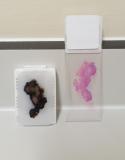Test Directory
Mismatch repair testing
Containers - Adult

FFPE block / H&E slide / Pathology report
|
|
Laboratory Site
Old Dalkeith Road
Edinburgh
EH16 4SA
Transport arrangements
Referral specimens should be sent directly to Molecular Pathology at the above address (see transport recommendations). For patients with pathology specimens held within NHS Lothian there is no need to arrange transport of specimens.
How to request
Mismatch repair testing can be requested individually or will be performed reflexively for colorectal cancer patients as indicated below.
Testing for NHS Lothian patients can be requested by email molecular.pathology@nhslothian.scot.nhs.uk. Referral requests must be accompanied by a completed request form.
Please also refer to our detailed requesting instructions.
Availability
Monday - Friday. 09:00 – 17:00
Anticipated turnaround
An integrated Molecular Pathology report should be available within 42 days (Lynch syndrome investigations), or 14 days for histological diagnosis or treatment stratification. See results.
Static information/disclaimer
Mismatch repair immunohistochemistry is accredited to ISO 15189. Microsatellite instability analysis and MLH1 promoter methylation are currently undergoing accreditation to ISO 15189:2012
Please note: alternative methodologies may be used. Full details will be included in all reports.
General additional information
A defective DNA mismatch repair pathway is one mechanism of carcinogenesis in colorectal cancer. Such defects may be sporadic or inherited. One well characterised inherited condition, known as Lynch Syndrome, results in predisposition to the development of colorectal and other cancers at a comparatively young age. Patients with Lynch Syndrome have a 40-80% chance of developing colorectal cancer, in most cases before the age of 50 and affected women have a 40-60% risk of developing endometrial cancers and 10-12% risk of developing ovarian cancer.
Although the risk of developing cancer in Lynch Syndrome is high, knowing the risks and getting appropriate treatment can save lives. Mismatch repair analysis can also inform treatment options and, in the case of tumours showing medullary morphology, be a useful adjunct to the histopathological diagnosis.
Analysis for a mismatch repair pathway defect is performed in all newly diagnosed colorectal cancer (CRC) patients in Scotland. Additionally, analysis of mismatch repair pathway defects may be performed on endometrial or ovarian cancers. Where a patient presents to clinical genetics and Lynch Syndrome is suspected, assessment for mismatch repair defects may be performed on other cancer types. The test used is dependent on the neoplastic content of the specimen; i.e. a sample with <20% tumour cells is assessed using immunohistochemistry (IHC) for four mismatch repair proteins (MLH1, PMS2, MHS2, MSH6). Samples with >20% neoplastic cell content will be assessed for microsatellite instability (MSI). MMR IHC will also be carried out to confirm equivocal MSI results as well as to determine which MMR proteins are affected. Both MMR IHC and MSI will be carried out on patient samples referred from Clinical Genetics where there is a strong clinical suspicion of Lynch Syndrome.
Patients whose cancers are found to have a defect within MSH2 & MSH6, PMS2 or MSH6 should be referred to clinical genetics for further assessment. CRC specimens that have a loss of MLH1 expression are further assessed for the presence of a BRAF V600E mutation. Coexistence of loss of MLH1 protein expression and the presence of a BRAF V600E mutation in CRC is indicative of a sporadic tumour, rather than one associated with Lynch syndrome, and thus these patients are not routinely referred to clinical genetics.
Where loss of MLH1 protein expression is identified (and no BRAF V600E mutation within CRC cases), assessment of the methylation status of the MLH1 promoter region is performed using a methylation specific ligation-dependent probe amplification (MS-MLPA) assay. Methylation of the promoter region of MLH1 is indicative of a sporadic tumour while a lack of methylation is interpreted as being suspicious of Lynch Syndrome. Therefore, if methylation is detected within the MLH1 promoter region, referral to clinical genetics is not advised. Where no methylation of the MLH1 promoter region is identified but loss of MLH1 protein expression exists, the patient should referred to clinical genetics for further investigation.
In recent years rare cases of constitutional MLH1 hypermethylation together with a somatic mutation in the functional allele have been reported in Lynch Syndrome. In situations where MLH1 methylation is detected in somatic tissue, MLH1 promoter methylation analysis is performed on “normal” (non tumour) DNA from the patient (when available) to determine whether the methylation is constitutional in nature.
For clinical advice on appropriate investigations, please contact our Molecular Pathology team.